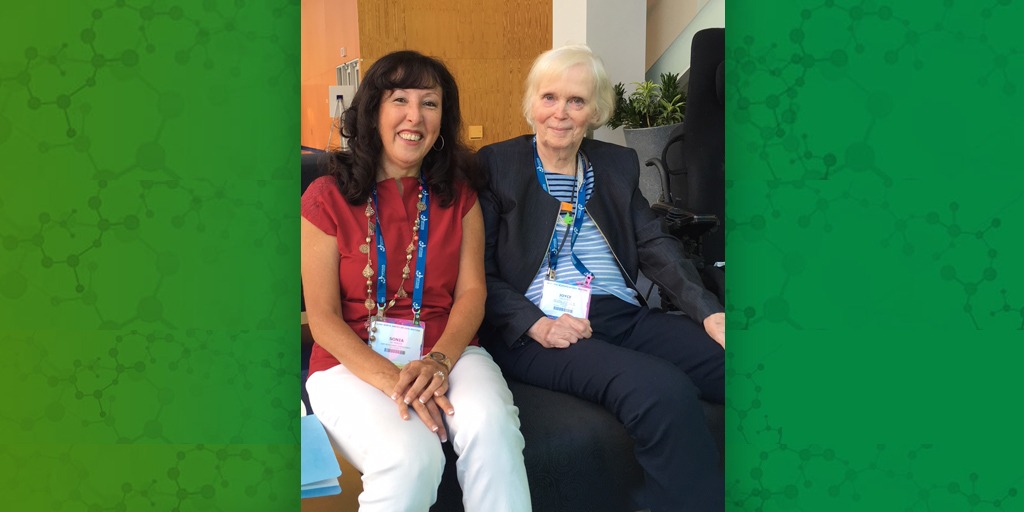Joyce Goldstein, Ph.D., a groundbreaking researcher in pharmacogenetics and a respected figure at NIEHS for more than 40 years, passed away August 7 after a long battle with multiple sclerosis. She was 78.
“Joyce served the scientific community with commitment for many decades,” said NIEHS Science Director Darryl Zeldin, Ph.D. “Her impact at NIEHS, NIH [National Institutes of Health], and the broader scientific research community has been enormous.”
At the time of her retirement as an NIEHS emeritus faculty member in 2015, Goldstein led the Human Metabolism Group and held a secondary appointment in the Epigenetics and Stem Cell Biology Laboratory.
“She was a pioneer at many levels,” said Stephen Ferguson, Ph.D., a chemist in the NIEHS Molecular Toxicology and Genomics Group. He joined Goldstein’s lab in 2000 as a postdoc from North Carolina State University. “She was exceedingly focused, passionate, and determined to unravel the complexities of human drug metabolism and drug interactions.”
Significance of her work
Goldstein’s seminal discovery helped lay the foundation for personalized medicine by providing a clearer understanding of how genetic variations can result in adverse reactions to certain drugs.
In 1991, Goldstein’s laboratory was the first to clone and identify two members of a subfamily of human cytochrome P450 genes, the CYP2C9 and CYP2C19 enzymes. The CYP2C family of enzymes metabolizes approximately 20 percent of clinically known drugs, as well as over-the-counter medicines such as ibuprofen.
Individuals with mutations in these enzymes cannot metabolize these drugs properly, which can result in overdosing that can lead to severe complications, even death.
For example, CYP2C9 metabolizes warfarin, an anticoagulant drug. Two mutant variants of the CYP2C9 gene metabolize warfarin so poorly that what is a normal dose for most people can be toxic for people with this mutation. The same is true for mutations of the CYP2C19 enzyme and the anti-clotting drug Plavix.
“Those individuals who have two null alleles [an alternate form of a gene] in the CYP2C19 gene and take Plavix might as well be taking starch pills,” said Goldstein in a 2010 talk at NIEHS.
Major achievements
Goldstein published over 160 peer-reviewed articles in leading biomedical journals as well as 25 book chapters and reviews. Her work has been cited over 12,000 times, earning her the designation of Highly Cited Author in pharmacology by the Institute for Scientific Information in 2006. Her two most prominent publications on the CYP2C19 gene together received more than 2,000 citations. She held two patents on the discovery of CYP2C19 and its major polymorphisms.
Goldstein was a member of the Faculty of 1000 and was certified by the American Board of Toxicology. In 2018, her work was recognized by the International Society for the Study of Xenobiotics (ISSX) with the North American Scientific Achievement Award.
Goldstein earned her Ph.D. in 1968 in pharmacology and biochemistry from the University of Texas Southwestern Medical School in Dallas. She joined NIEHS in 1977, and was among the first women to receive tenure. By 1996, she was leading the Human Metabolism Group. In 2015, Goldstein became an NIEHS Scientist Emeritus.
A spirit of camaraderie
Sonia de Morais, Ph.D., did her postdoctoral fellowship with Goldstein at a time (1991-1995) when her lab was making its greatest advances. “It was the best time in my scientific career,” said de Morais. “I’ll never forget the sense of innovation and curiosity, the spirit of camaraderie, that Joyce fostered. Many of those friendships are still strong to this day.”
“She has lots of successful disciples,” Ferguson said. “If it weren’t for her taking a chance on me, I wouldn’t be where I am today.”
Citations:
de Morais SMF, Wilkinson GR, Blaisdell J, Nakamura K, Meyer A, Goldstein JA. 1994. The major genetic defect responsible for the polymorphism of S-mephenytoin metabolism in humans. J Biol Chem 269:15419–15422.
de Morais SMF, Wilkinson GR, Blaisdell J, Meyer UA, Nakamura K, Goldstein JA, Goldstein JA. 1994. Identification of a new genetic defect responsible for the polymorphism of (S)-mephenytoin metabolism in Japanese. Mol Pharmacol 46:595–598.
(John Yewell is a contract writer for the NIEHS Office of Communications and Public Liaison.)
Source link
factor.niehs.nih.gov

